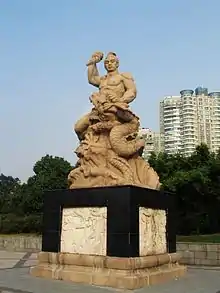Zhou Chu | |
|---|---|
| 周處 | |
 | |
| Palace Aide to the Censor-in-Chief (御史中丞) | |
| In office ?–297 | |
| Monarch | Emperor Hui of Jin |
| Personal details | |
| Born | 236 Yixing, Eastern Wu (present-day Jiangsu) |
| Died | 297 (aged 60–61) |
| Parent |
|
| Courtesy name | Ziyin (子隱) |
Zhou Chu (Chinese: 周處; 236?[1]–297), courtesy name Ziyin (子隱), was a Western Jin-era Chinese general. He was the son of Zhou Fang, a famous Eastern Wu general. He had a reputation for uprightness and integrity and is the protagonist of a famous Chinese legend, Zhou Chu Chu San Hai (周處除三害) or "Zhou Chu Eradicates the Three Scrouges", in which he sought out to kill a tiger and dragon that were terrorizing his hometown. He participated in the campaign against Qi Wannian's Rebellion when he was forced by his superiors to fight the 70,000-strong enemy head-on with 5,000 soldiers and no supply. Zhou Chu died in a valiant last stand and was posthumously honoured by the Western and Eastern Jin courts.
Zhou Chu is depicted in the woodcut print Wu Shuang Pu (無雙譜, Table of Peerless Heroes) by Jin Guliang.
Eradicating the Three Scourges
A folk story about Zhou Chu appeared in the 430 book A New Account of the Tales of the World and proved to be very popular. The story claims that Zhou Chu was such a cruel and violent ruffian in his younger days that he was called one of the "Three Scourges" by the villagers in his native Yixing County (present-day city of Yixing, Jiangsu), along with a tiger and a dragon.
Prompted by a villager, Zhou Chu took on the challenge to seek out and kill the tiger and the scaly dragon that lived in a stream (the jiao).[lower-alpha 1] His battle with this dragon endured for 3 days in Lake Tai, and the villagers were celebrating the demise of the two scourges when Zhou Chu returned triumphant with the dragon's head. That was when he realized that he was the last scourge that the villagers feared. Determined to mend his old ways, he sought out Eastern Wu generals Lu Ji and Lu Yun (陸雲), and received encouragement. Eventually he became an accomplished general beloved by his people.[2][4][3]
Death
Zhou Chu became Palace Aide to the Censor-in-Chief (御史中丞) and had no fear in indicting and exposing the wrongdoings of other ministers. He thus offended many, including Sima Rong (司馬肜), son of Sima Yi and an uncle of Emperor Wu of Jin, founder of Western Jin. In 296, when Sima Rong was named the Grand General of the Western expedition to quell Qi Wannian's rebellion, Zhou Chu was named the vanguard general. His fellow general Sun Xiu (孫秀) warned him and suggested him to bid his aging mother a final farewell. Zhou Chu replied, "One cannot fulfill both filial piety and loyalty at the same time. Since I have already chosen to serve my country... I will die for it."
Zhou Chu was ordered to take 5,000 soldiers to attack the 70,000-strong enemy. After the attacks began, Sima Rong also ordered his supply to be cut off completely. Zhou's troops ran out of arrows and the generals assigned to reinforce him did not help. When asked to flee, Zhou Chu replied, "I am a minister of a nation. Isn't it proper to die for one's country?" He fought to his death.[5][6]
Explanatory notes
References
- ↑ Historical sources did not record when Zhou Chu was born. Qing-era scholar Lao Ge in his Jin Shu Xiao Kan Ji ("Record on Cross-checking the Book of Jin") claimed that Zhou Chu was 62 (by East Asian reckoning) when he died, without citing where he got the figure from. According to Sun Quan's and Zhou Fang's biographies in Sanguozhi, Zhou Fang was appointed Administrator of Poyang Commandery in early 226, and served in the commandery for about 13 years. Thus, Zhou Fang's death date should be in early 239. Zhou Chu's biography in Book of Jin mentioned that he was orphaned at a young age. Thus, he was not Zhou Fang's posthumous son. As such, his birth year should be on or before 239.
- 1 2 Liu Yiqing (2017). Shih-shuo Hsin-yu: A New Account of Tales of the World. Translated by Richard B. Mather (Second ed.). University of Michigan Press. pp. 341–. ISBN 978-1-938-93701-9.
- 1 2 Liu Yiqing 劉義慶. "Chapter 15. Self-renewal 自新第十五". Shishuo xinyu 世說新語 – via Wikisource.
- ↑ Minford, John; Lau, Joseph S.M., eds. (2002). "Hearing the Way in the Morning". An Anthology of Translations: Classical Chinese Literature, Volume I: From Antiquity to the Tang Dynasty. Translated by Richard B. Mather. Columbia University Press. pp. 667–668. ISBN 0-231-09676-3.
- ↑ Wu Fusheng (2008). Panegyric Poetry in Early Medieval China. State University of New York Press. p.67.
- ↑ Kleeman, Terry F. (1998). Great Perfection: Religion and Ethnicity in a Chinese Millennial Kingdom. University of Hawaii Press. p.91.